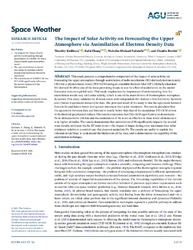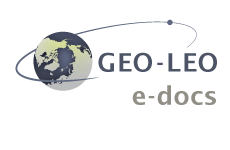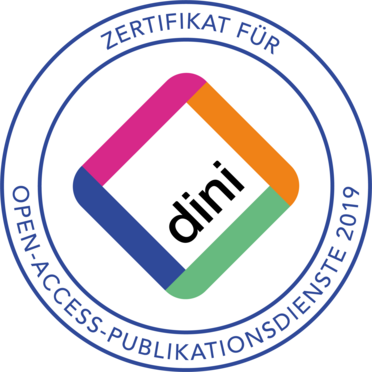The Impact of Solar Activity on Forecasting the Upper Atmosphere via Assimilation of Electron Density Data
Kodikara, Timothy; Zhang, Kefei; Pedatella, Nicholas Michael; Borries, Claudia, 2021: The Impact of Solar Activity on Forecasting the Upper Atmosphere via Assimilation of Electron Density Data. In: Space Weather, Band 19, 5, DOI: 10.23689/fidgeo-4270.
 |
Dokument öffnen: |
This study presents a comprehensive comparison of the impact of solar activity on forecasting the upper atmosphere through assimilation of radio occultation (RO)‐derived electron density (Ne) into a physics‐based model (TIE‐GCM) using an ensemble Kalman filter (KF). Globally abundant RO‐derived Ne offers one of the most promising means to test the effect of assimilation on the model forecasted state on a global scale. This study emphasizes the importance of understanding how the assimilation results vary with solar activity, which is one of the main drivers of thermosphere‐ionosphere dynamics. This study validates the forecast states with independent RO‐derived GRACE (Gravity Recovery and Climate Experiment mission) Ne data. The principal result of the study is that the agreement between forecast Ne and data is better during solar minimum than solar maximum. The results also show that the agreement between data and forecast is mostly better than that of the standalone TIE‐GCM driven with observed geophysical indices. The results emphasize that TIE‐GCM significantly underestimate Ne in altitudes below 250 km and the assimilation of Ne is not as effective in these lower altitudes as it is in higher altitudes. The results demonstrate that assimilation of Ne significantly impacts the neutral mass density estimates via the KF state vector—the impact is larger during solar maximum than solar minimum relative to a control case that does not assimilate Ne. The results are useful to explain the inherent model bias, to understand the limitations of the data, and to demonstrate the capability of the assimilation technique. Key Points:
Investigates the impact of solar activity on forecasting through assimilation of COSMIC‐Ne into a physics‐based upper atmosphere model.
The agreement between hourly forecasted Ne and data is better during solar minimum than solar maximum.
The assimilation of COSMIC‐Ne into TIE‐GCM significantly influences the neutral dynamics of the thermosphere.
Statistik:
ZugriffsstatistikSammlung:
Schlagworte:
COSMICdata assimilation
ensemble Kalman filter
ionosphere forecasts
neutral mass density forecasts
TIE‐GCM
upper atmosphere
impact of solar activity
thermosphere-ionosphere dynamics
This is an open access article under the terms of the Creative Commons Attribution‐NonCommercial‐NoDerivs License, which permits use and distribution in any medium, provided the original work is properly cited, the use is non‐commercial and no modifications or adaptations are made.

